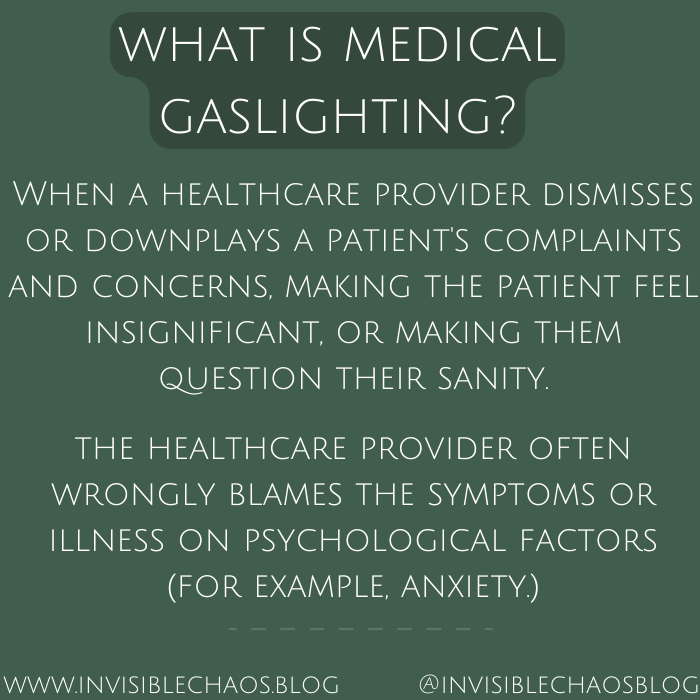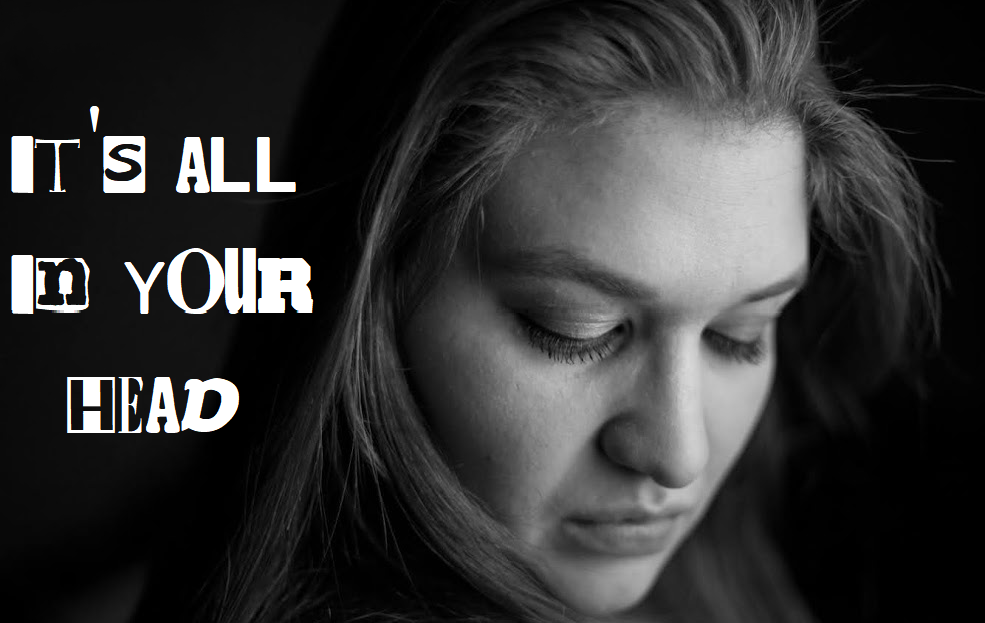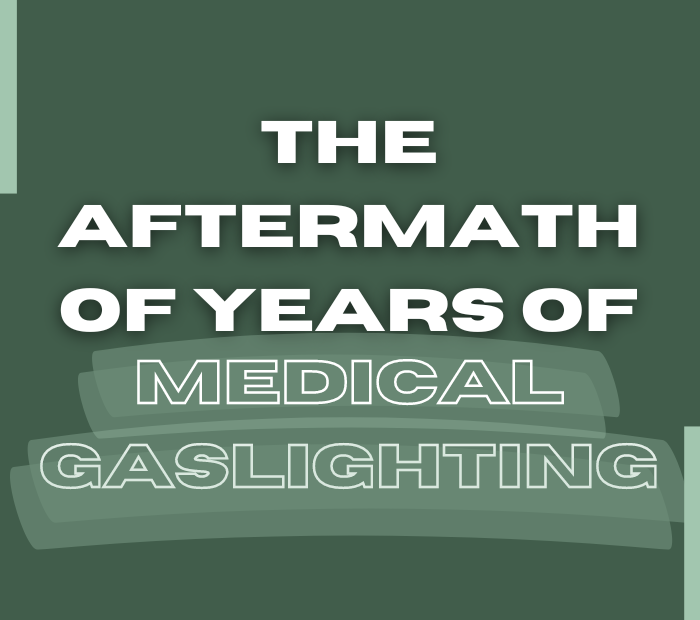I’ve recently come to the realization that I tend to downplay my symptoms and how bad I’m actually feeling to my doctors. This is something I didn’t even realize I did, and once I realized, it was both a shock to myself and an eye-opening observation. After years of being dismissed, gaslighted, and traumatized by doctors and healthcare providers, it makes a lot of sense that I would begin to do this. It’s become my coping mechanism.
What is Medical Gaslighting?
Gaslighting is a form of psychological manipulation that causes the victim to question their own sanity, reality, perceptions, memories, etc. The term comes from a 1944 movie called “Gaslight” in which a husband tricks (gaslights) his wife into thinking she’s going insane, just so he can steal from her. The term did not gain popularity until recent years though, in the mid-2010s. Today, it’s used quite often to describe this particular manipulation and abuse.
Gaslighting involves two people– the “gaslighter”, which is the person who is manipulating the other, and the “gaslighted”, which is the victim, who is struggling to is struggling to maintain their own individual autonomy.

Medical gaslighting is when a doctor, nurse, or other healthcare provider (the gaslighter) dismisses a patient’s (the gaslighted) symptoms, concerns, and complaints. Sometimes the healthcare provider may blame the symptoms on something else (like anxiety, for example), or tell the patient it’s all in their head.
Women have been gaslighted for thousands of years, especially by men and people in power, and doctors who medically gaslight us are no different. It’s nothing new– even though the term may be something that was coined in the last century, it’s something that has only been used in media and in conversation for the past decade or so.

The Aftermath of Years of Medical Gaslighting
It took years for me to even realize that I had anxiety from past doctors who gaslighted me, and even more time to realize I had PTSD from it.
As someone who has been going to doctors pretty much their whole life (I was diagnosed with OCD at 8, and went to multiple doctors back then before I finally got a diagnosis). At 11, my IBS symptoms started, and I went to doctors for years trying to get to the bottom of that. At 26, my POTS symptoms would start, and my road to diagnosis for that would begin shortly after.
Twenty-eight years of doctors appointments, and as you can imagine, not all of them were good. It does a number on you after a while, and the trauma starts to add up. That’s where coping mechanisms come in.
Coping mechanisms are psychological strategies and behaviors that people use to manage or deal with the stress and anxiety.
The result for me? Tiptoeing at doctors appointments and walking on eggshells so my doctor doesn’t give up on me, or kick me out of their office, or tell me it’s all in my head, because another one of those experiences will throw me over the edge.
I find myself apologizing for how complex my conditions are, and how many conditions I have. I apologize for bringing up new symptoms, for explaining just how bad my symptoms really are. I apologize for causing any inconvenience, I apologize for even having these conditions, as if I have any control over it. There’s a lot of apologizing, and never for anything I need to apologize for.
What am I apologizing for? Why am I apologizing? It sounds ridiculous, and it is, I know it is. But I also know myself, and realization doesn’t mean I’m going to stop doing it overnight.
I’m still afraid, actually afraid, of putting too much pressure on a doctor. I’m afraid of overwhelming them. I’m afraid of being an inconvenience (this is a big one, and I do this with more than just my doctors). I apologize for all of the above. I’ve actually said the words, on multiple occasions “I’m sorry, I know it’s a lot!” or “I’m sorry, I know I’m a complex case”, or “I’m sorry, I don’t want to overwhelm you!”
What am I afraid of? Not being believed. Being told it’s not as bad as I say it is. Being told there’s no way I can have all these symptoms. Being told I’m too complex for them, and they can no longer treat me because it’s just too much. Being berated. Being gaslighted, again. More trauma I don’t know if I can handle.

Words we’ve heard too much, but each time stings just as much as the first time we’ve heard it.
Downplaying Symptoms to Doctors
Downplaying my symptoms to my doctors hurts no one but myself. If I’m not truthful with my doctors about how bad I really feel, and I’m not naming all of my newest symptoms, I’ll never get the treatments I need to get better. I know this, but sometimes it’s so hard to be truthful when you’re afraid of the response you’ll get.
I don’t downplay my symptoms at every appointment, and I don’t do it with every doctor. But I still do it sometimes, and it’s enough to hurt me in the long run.
I’ve noticed I do it with my current Osteopath who does my Osteopathic Manipulative Medicine (OMM). While I try to be honest about where I am on the pain scale, I try not to overwhelm him with too many symptoms and details.
The pain scale is hard to describe to a doctor, because it varies so much. I never say I’m at a 10, because I always know the pain can get worse. Whenever I don’t think it can, I get proven wrong.
People who live with chronic pain everyday of their lives learn to live with it, and no matter what we do, we’re always in pain. Washing dishes? Pain. Lying on the couch? Pain. Trying to sleep? Pain. It never fails.
I tell my doctor I’m usually at a 6 or 7 on an everyday basis, but I get spikes of worse days and some days with less pain. I’m never at a 0 though, and I never will be, it’s just not realistic.
One thing I have trouble describing to my doctors is my sleep schedule. They just don’t understand it. A few years back, I was diagnosed with Delayed Sleep Phase Syndrome (DSPS) after years of not knowing why my circadian rhythm was reversed. DSPS is when your sleep cycle is delayed by at least 2 hours or more beyond what is considered a “normal” bedtime by societal norms. It can vary from person-to-person, but mine is so severe, that I often don’t fall asleep until the early morning (typically between 4-7am) and I don’t wake up until anywhere between 3-5pm, depending on the day. Like most things, it can vary, but those are averages.
No doctor, besides the sleep doctor who diagnosed me, has ever heard of DSPS, so when I explain to them my sleep schedule (and my diagnosis), they look at me with judgmental eyes and tell me how that’s not a health sleep schedule. I’m aware, Doctor, but it’s the only time my body lets me sleep.
Another thing I wasn’t honest about in the past is how much time I can spend sleeping because of my deep fatigue. Some days it can be a typical 8 hours or so, but I can also sleep 14 hours without a problem. No matter how much (or how little) sleep I get, I always feel the same– like I’m hungover and I’ve been scraped off the sidewalk.
My fatigue gets so bad that I can’t lift my head some days. It takes too much energy to look at my phone, and watching TV is out of the question during those times, I lack the energy and the focus to do such things when I’m at my worst. It’s hard be brutally honest about all of this with doctors sometimes, because I’m embarrassed by it. I don’t want to admit out how bad I really am, I don’t want the judgement.
I try to be as truthful as possible with my neurologist, who treats my POTS and dysautonomia, because I know he won’t judge me or gaslight me. I’ve been seeing him for 7 years now, and I trust him enough to know this.
As for my primary care provider, sometimes I’ll downplay my symptoms, sometimes I’ll be honest, it depends how she seems to be taking everything I’m laying on her. Again, there’s me feeling like a burden, even to my own doctor, whose job it is to treat sick people. That’s how screwed up I am from years of trauma.
I don’t think my doctors realize just how bad I am. So many doctors tell me how great I take all of this (chronic illness), and how I look healthy. Yes, I’m aware I look healthy, but I’m not healthy. That’s the beauty (or ugliness, really) of these chronic illnesses– they’re invisible. I look healthy, but I feel like I’m dying inside. And how do you explain that to someone else? It’s not easy.
Sometimes I gaslight myself, because when you’ve been gaslighted so many times, it starts to make you actually believe it yourself.
Self-Gaslighting
When you’ve been told by the medical professionals it’s in your head more than once (or even once– once is enough to do the trick), you start to question your own sanity. That’s what gaslighting is, right? This is something I have on my list to make a separate post about at some point, but it fits into this as well, so I’ll touch on it as briefly as I can.
When I was in the first year of my POTS symptoms, and my former Primary Care Provider told me I needed to consider that it was all in my head (without doing a single test on me to see what could possibly be making me dizzy 24/7), it was extremely traumatic for me. I had been seeing her for about a decade at that point, and I had trusted this woman. My entire family went to her, and we all trusted her. After that appointment, no one went back, for obvious reasons.
After the doctors started adding up and no one was able to figure out why I was dizzy 24/7, I started thinking back to those words that doctor said to me. “Maybe it’s time to consider it’s all in your head.” It would replay over and over in my head, and after a while of no doctor being able to give me an answer, I started to believe it myself.
Maybe it was in my head. I mean, I did have history of mental illness with OCD, anxiety, and depression….. maybe I was creating this in my head somehow? I didn’t know how, but it could be the only possible explanation, right? At the time, I knew nothing of invisible illnesses, and very little about chronic illnesses. I started to worry that I was somehow imagining the dizziness. I started to doubt my own sanity, my own body, my own experiences, my own judgement. I started to not trust myself.
And then, in the midst of the doubt, in the middle of self-gaslighting, I was diagnosed with POTS.
My cardiologist at the time asked how I felt after my diagnosis. My response threw him off, because he was expecting me to say something like “sad” or “afraid”. My response, though? “Jubilant.” He did a double take when I said that. Jubilant? Yes, jubilant. It was the proof I needed that I wasn’t making it all up. That I wasn’t going crazy after all. That my symptoms were real, they were valid, they were legitimate.
Several months after diagnosis, I went to a place that I always tell people never to go to, and I had the worst medical gaslighting experience I’d have to date. After that appointment, I started to doubt myself a little again, but not totally. At that point, I already had my diagnosis, and I had learned enough about POTS to know the doctor I had seen was completely off his rocker.
That doesn’t mean it didn’t hurt though, and completely throw me off. It was a very traumatic experience for me, and I still have PTSD from it. But I knew a little better than I did the first time, at least.
It did still throw me off though, and since I hadn’t found anyone who could treat my POTS, I was at a loss. Finally I met my neurologist, who has been my treating doctor for POTS since, and he has helped me so much. He also did vestibular testing that showed that I do in fact have vestibular dysfunction, which is why I’m constantly dizzy. He thinks the vestibular dysfunction is caused by the dysautonomia though, and said there’s nothing I can do to help it. I even tried 6 months of balance physical therapy, and that did nothing. After 6 months, they told me since it wasn’t working, it made no sense to continue it, and I stopped.
But the diagnoses were enough for me to stop questioning my sanity all the time. I at least knew I was sick, and I had real, concrete diagnoses.
The self-gaslighting still exists, though. Although I’m not gaslighting myself about actually being sick (I have my diagnoses– plenty of them), I now gaslight myself on just how sick I am.
On my “good days” (days with less pain, never no pain, and days with less fatigue, never no fatigue), I find myself questioning my symptoms the most.
I ask myself “am I really that bad? Am I as sick as I say I am on my bad days??? It can’t be….” and I start to gaslight myself. I question it all. And then, usually within a couple hours, sometimes the next day, my body kicks itself in the butt, and I’m back to a bad day. And it’s at that moment that I’m brought back to reality. Oh, right, I am very sick. I am chronically ill. My symptoms are bad. I am in a lot of pain. You’re not crazy, you’re letting these doubts get into your head and plant seeds.
And that is all thanks to doctors who made you doubt your own sanity.
